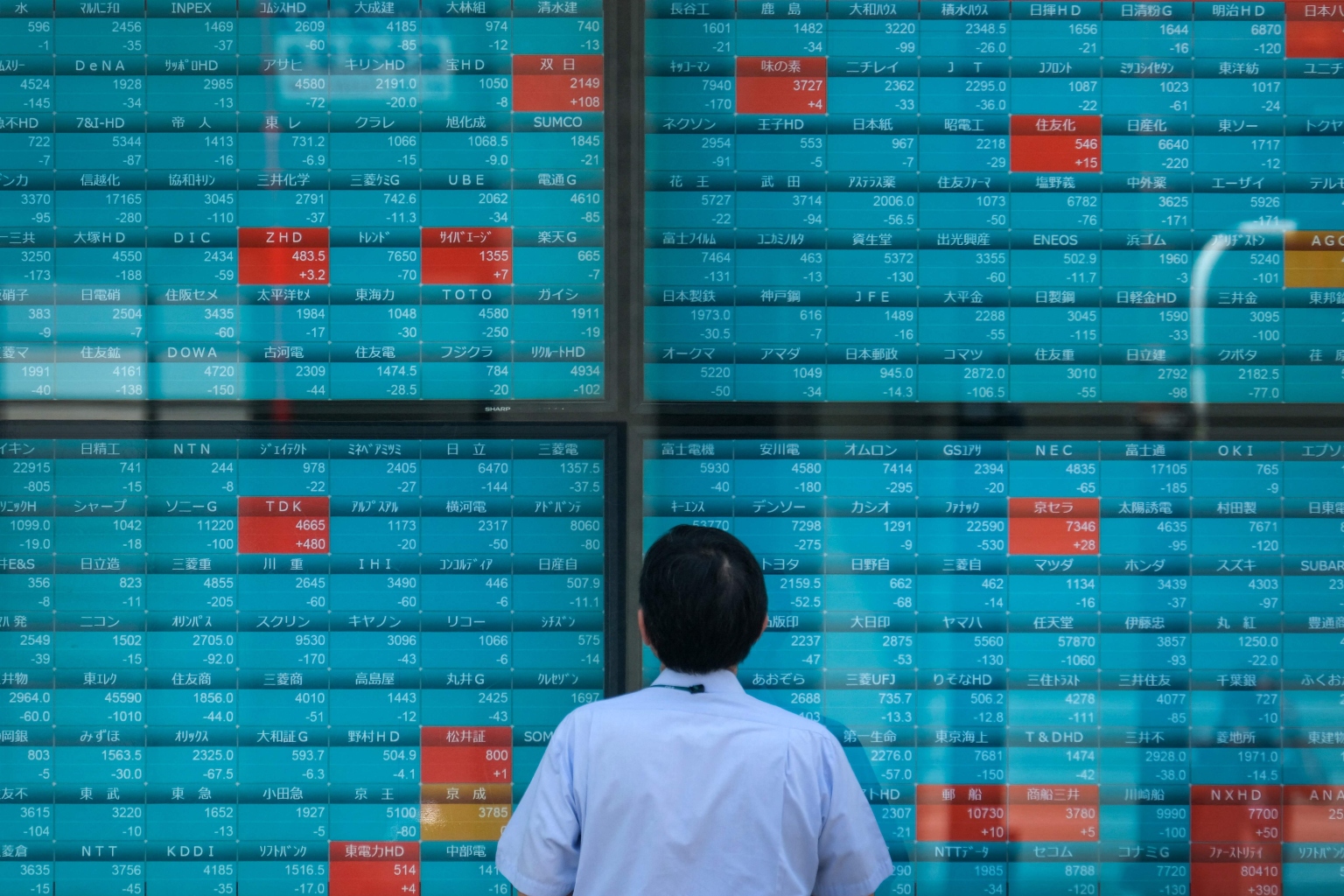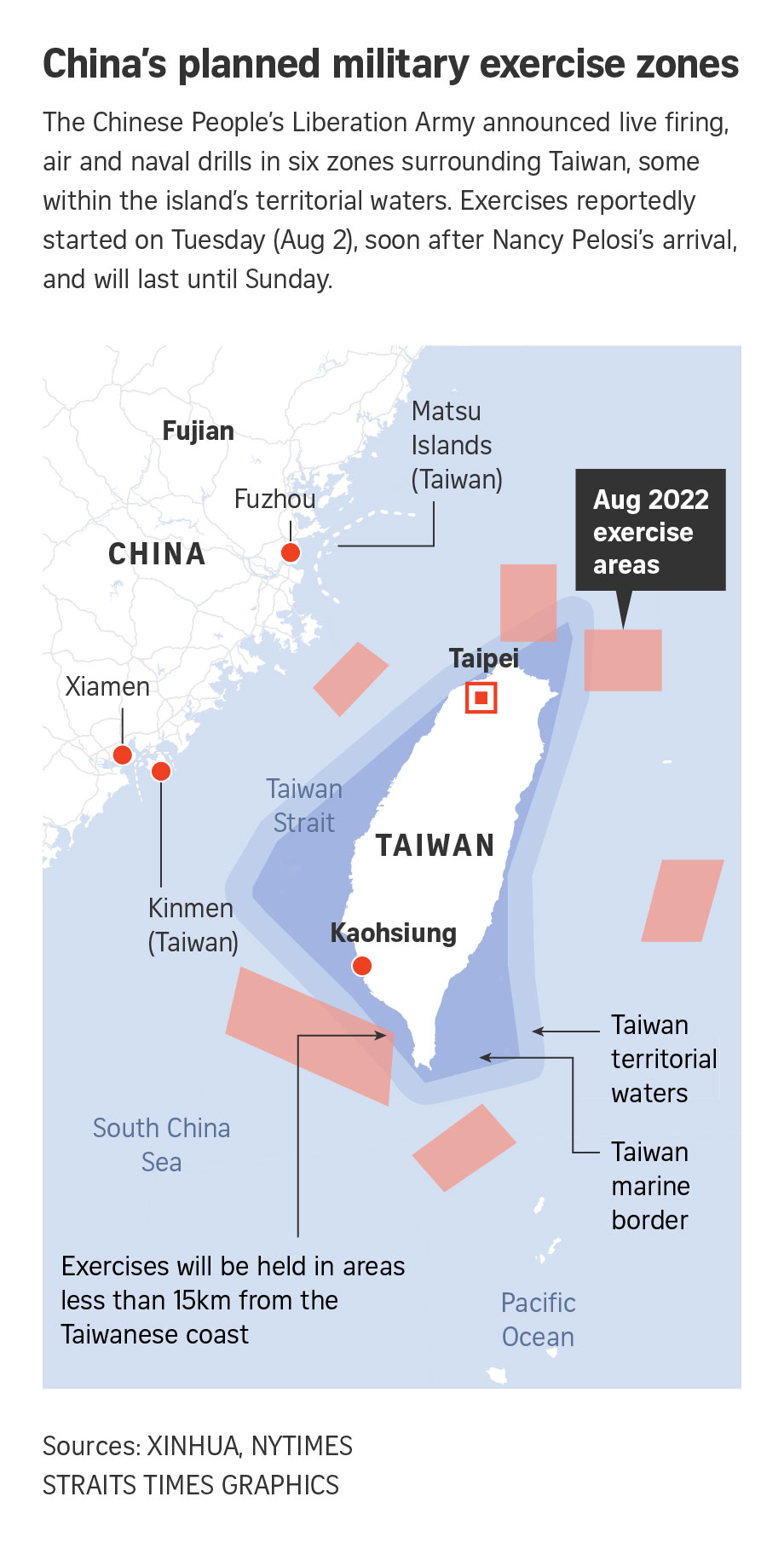Pelosi in Taiwan: Asia stocks rise but investors remain nervous over China-US tensions
Sign up now: Get ST's newsletters delivered to your inbox

Japan's Nikkei gained 0.5 per cent, rebounding from Tuesday's two-week closing low.
PHOTO: AFP
Follow topic:
TOKYO (AFP, BLOOMBERG) - Asian markets closed higher on Wednesday (Aug 3) after the previous day’s tumble, with the focus on US House Speaker Nancy Pelosi’s visit to Taiwan, which has further strained already tense China-US ties and raised concerns about the long-term impact on the global outlook.
The highest profile trip to the island in 25 years by a US politician was met with condemnation from Beijing, which warned of serious economic and military consequences.
Taiwan said more than 20 Chinese military aircraft had flown into the island’s air defence identification zone - an area wider than its territorial airspace that overlaps with part of China’s air defence zone. The People’s Liberation Army was also due to conduct a series of drills.
Beijing views the self-ruled island as part of its territory to be seized by force if necessary.
South Korean shares ended at a more than seven-week high, with the benchmark with the Kospi up 0.89 per cent at 2,461.45, its highest closing level since June 14.
Japanese shares were up too. The Nikkei share average gained 0.53 per cent to 27,741.90, after shedding 1.42 per cent on Tuesday in its biggest daily loss in three weeks.
The Straits Times Index rose 12.91 points cent to 3,252.06.
Taiwan shares were up, with the Taiwan Stock Exchange Weighted Index up slightly, by 0.2 per cent, to 14,777.02, while Hong Kong shares closed with small gains after the previous day’s sharp losses, with the Hang Seng Index adding 0.4per cent to 19,767.09.
However, the Chinese and Australia bourses closed down.
“Hong Kong shares have recovered around a third of yesterday’s losses because of relief that there was no major confrontation overnight,” said Mr Steven Leung, executive director for institutional sales at UOB Kay Hian in Hong Kong.
“However, investors are going to remain nervous due to the military exercises planned for after Pelosi’s departure.”
Singapore’s Straits Times Index opened down 0.2 per cent but was up 0.3 per cent at 11.13am local time.
The “short-term implication may be ‘sell the rumour, buy the news’ as the official response so far remains much more restrained versus what the market has feared”, said Mr Bao Xiadong from Edmond de Rothschild Asset Management.
“But the mid/long-term implication can be more significant, which may be currently overlooked by the market. The official return of the US influence in Asia-Pacific will inevitably accelerate US-China decoupling.”
Analysts are also keen to find out what the White House’s response will be, particularly ahead of mid-term elections in November with anti-China rhetoric playing well with voters, but with President Joe Biden keen not to further harm economic ties.
Missile tests
China, which regards Taiwan as part of its territory, announced missile tests and military drills around the island after Mrs Pelosi became the highest-ranking American politician to visit in 25 years.
China also halted natural sand exports to Taiwan and some fish and fruit imports from the island.
While fears of an acute deterioration in ties between the US and China appear to have cooled, the ill-will highlights the risk of longer-term economic decoupling with an array of potential impacts, such as stickier inflation as supply chains adjust.
China's Contemporary Amperex Technology, the world's biggest maker of batteries for electric vehicles, decided to push back announcing a multi-billion dollar North American plant to supply Tesla and Ford Motor due to tensions raised by Mrs Pelosi's trip to Taiwan, according to sources familiar with the matter.
"Pelosi's trip might exacerbate the already strained US-China relationship, and impede on growth if more counter-productive measures are deployed," said Mr Bernard Shaw, an Asia bond syndicate banker at Daiwa Capital Markets Singapore.

Fed talk
The positive start to the day in Asia followed a drop on Wall Street, where the Taiwan crisis was compounded by a series of hawkish comments from a trio of Federal Reserve officials indicating more big interest rate hikes could still be in the pipeline.
Two of them, San Francisco Fed president Mary Daly and Chicago Fed president Charles Evans, are widely regarded as doves.
Traders now see a chance of about 44 per cent that the Fed will hike by another 75 basis points at its next meeting in September.
Benchmark long-term Treasury yields were around 2.71 per cent in Tokyo, not far from the overnight high of 2.774 per cent following a 14 basis point surge.
Dr Daly, San Francisco Fed president, said the Fed has "a long way to go" on reaching price stability around a 2 per cent inflation target.
Her Cleveland counterpart, Dr Loretta Mester, said she wants to see "very compelling evidence" that month-to-month price increases are moderating.
"It's hard to see any meaningful upside in equities right now," Ms Xi Qiao, managing director for global wealth management at UBS Group, said on Bloomberg Television. "The market is going to trade pretty mixed, stay choppy until we have a little bit more certainty."
Elsewhere, oil traded at about US$94 a barrel ahead of an Opec+ crude production meeting. Gold climbed and Bitcoin dropped under US$23,000.

